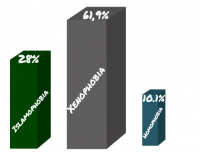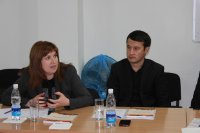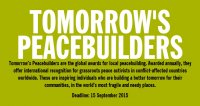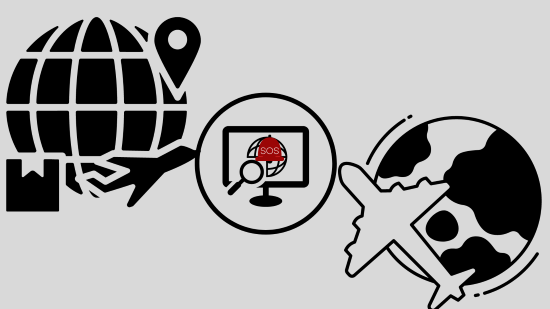Journalism must become the key vehicle in countering hate speech, xenophobia and propaganda in media and on the Internet.
On the occasion of the World Press Freedom Day celebrated on May 3, 2016, the School of Peacemaking and Media Technology in Central Asia encourages the promotion of quality journalism and ethic communications in order to counter modern challenges.
In Central Asia, as well as in many other countries around the world, the crisis in the media sphere has been caused by the governmental control, lack of journalism standards, and increasing language of intolerance. Continuous monitoring and studies of media and Internet highlight such trends. Xenophobia and its various types are expressed in open or veiled forms of intolerance in the media environment, which results in the hostility in response, negative impact on the audience, and encouragement of inhumane stereotypes in the society. The negative discourse is promoted by the propaganda, network aggression, and a series of fibs circulated in media and Internet.
 ASTANA, 19 April 2016 – An OSCE-supported two-day training seminar on
protecting freedom of expression and countering hate speech on the
Internet began today in Astana.
ASTANA, 19 April 2016 – An OSCE-supported two-day training seminar on
protecting freedom of expression and countering hate speech on the
Internet began today in Astana.
Some 40 journalists, lawyers, academics, representatives of the Justice, Interior, Investment and Development Ministries, the Prosecutor General’s Office, the Anti-terrorism Centre under the National Security Committee and Supreme Court gathered to discuss the relationship between media and hate speech policies and ways to enhance co-operation between governments, civil society and media organizations.
The event was co-organized by the OSCE Programme Office in Astana and the Legal Media Centre, a non-governmental organization based in Kazakhstan.
The public discussion "Hate Speech and Discrimination through the Media. Trends, Influence, Challenges, Countering” was held on February 10, 2016.
The participants of the event were Shawn Steil, Canada’s Ambassador to Kazakhstan, Kyrgyzstan and Tajikistan, Sanzharbek Tazhimatov, expert of the department of ethnic, religious policies and interaction with civil society of the Presidential Administration of the Kyrgyz Republic, Ablabek Asankanov, head of Monitoring Center of GAMSUMO [State Agency for Local Government Affairs and Ethnic Relations] of the Kyrgyz Republic, representatives of international, civil, religious organizations, and media experts.
Interactive lecture "Freedom of expression: how not to suffer for statements in media and on the Internet and not to violate the anti-extremism law. Kyrgyz reality and Russian practices” with participation of invited expert Alexander Verkhovsky, director of Sova Center for Information and Analysis (Russia) was held on February 4, 2016.
Experts, lawyers, journalists, representatives of international and public organizations were invited to the event.
 School of Peacemaking and Media Technologies has presented its interim report "Hate Speech in
Media, Internet and Public Discourse of Kyrgyzstan – 2015”.
School of Peacemaking and Media Technologies has presented its interim report "Hate Speech in
Media, Internet and Public Discourse of Kyrgyzstan – 2015”.
The report was based on the analysis of hate content carried in the surveyed print, broadcast, online media and social networks in Kyrgyz and Russian languages for November-December 2015 and data compared to other periods of the year, as well as the findings based on field studies.
The freedom of expression in the media scene of Kyrgyzstan is closely related to the lexis of hate, which is based on clearly xenophobic statements, political incorrectness and emphasizes poor journalistic standards in the media, while posts in social networks sometimes provoke network aggression. Despite the fact that Kyrgyzstan ranks higher in the Press Freedom Index[1], than the neighboring states in Central Asia, it still has problems with ethics.
The discriminatory language against minorities was also detected in those media outlets that describe themselves as analytical media. In their articles and reports about the problems faced by minorities, authors also create their negative image. Thus, the media contribute to the spreading of xenophobia – ethnic, religious, social and other types.
 The Representative Office of
the Institute for War and Peace Reporting (IWPR) in Kyrgyzstan, with the
participation of representatives of the CIS Antiterrorist Center, Ministry of
Internal Affairs, the State Commission on Religious Affairs, NGOs, experts and
researchers, discussed the main causes of radicalization and the ways to
prevent them.
The Representative Office of
the Institute for War and Peace Reporting (IWPR) in Kyrgyzstan, with the
participation of representatives of the CIS Antiterrorist Center, Ministry of
Internal Affairs, the State Commission on Religious Affairs, NGOs, experts and
researchers, discussed the main causes of radicalization and the ways to
prevent them.
 Such data were
submitted in the report of School of Peacemaking and Media Technologies that
was presented on November 19 at the forum "Right to Equality and
Nondiscrimination: Peacebuilding and Prevention of Ethnic Conflicts”.
Such data were
submitted in the report of School of Peacemaking and Media Technologies that
was presented on November 19 at the forum "Right to Equality and
Nondiscrimination: Peacebuilding and Prevention of Ethnic Conflicts”.
The presentation was prepared under the media monitoring project supported by the Canadian Fund for Local Initiatives (CFLI).
The report contained the trends and dynamics of ethnic stereotypes used, as well as the types of hate speech spread in the media and on the internet of Kyrgyzstan, spoken out by high profile speakers.
The project aims to monitor and analysis of hate speech in the media and public discourse, development of recommendations, and public outreach campaign to prevent violence and discrimination against minorities in order to protect human rights and basic freedoms.
 Tomorrow’s
Peacebuilders are the global awards for local peacebuilding. Awarded annually,
they offer international recognition for grassroots peace activists in
conflict-affected countries worldwide. These are inspiring individuals who are
building a better tomorrow for their communities, in the world’s most fragile
and needy places.More http://www.peacedirect.org/tp/
Tomorrow’s
Peacebuilders are the global awards for local peacebuilding. Awarded annually,
they offer international recognition for grassroots peace activists in
conflict-affected countries worldwide. These are inspiring individuals who are
building a better tomorrow for their communities, in the world’s most fragile
and needy places.More http://www.peacedirect.org/tp/

Состоялась онлайн конференция, на которой обсуждались риски транснациональных репрессий в работе активистов, медиаработников, юристов и…
Можете ли вы ответить на вопрос: что такое миротворческая журналистика или журналистика мира, как это принято говорить в международной практике?
Это – позитивная журналистика?
Это – смягчение конфликта за счет историй, где говорится о том, как власти решают проблему?
Или это – баланс фактов и мнений, построенных на беспристрастной хронологии освещаемого вами конфликта?
Ни один из трех предложенных вопросов не является миротворческой журналистикой, поскольку она строится на других принципах.
Смотрите видеоурок от Инги Сикорской, директора Школы миротворчества и медиатехнологий в ЦА, медиаэксперта, исследователя, журналистки.
Инга освещала разные конфликтные события, работала в Афганистане, написала ряд учебных пособий для журналистов и активистов, в том числе "Как женщине-журналисту делать визуальные репортажи из Афганистана",
"Как освещать многообразие и этнические конфликты,"Как журналистам избегать языка вражды в своих репортажах" и другие.
Инга проводит семинары по медиа, кризисным и миротворческим коммуникациям в Центральной Азии и других странах.
Смотрите видео-урок с примерами и пояснениями, а потом выполните упражнение.
![]() Группа независимого мониторинга,
экспертизы, анализа и образования Школы миротворчества и медиатехнологий в ЦА
оказывает услуги в НКО секторе, проводит консультации, экспертизу тренинги по
вопросам, связанным с медиасферой и публичным дискурсом.
Группа независимого мониторинга,
экспертизы, анализа и образования Школы миротворчества и медиатехнологий в ЦА
оказывает услуги в НКО секторе, проводит консультации, экспертизу тренинги по
вопросам, связанным с медиасферой и публичным дискурсом.
Мы проводим медиа-мониторинги, медиа-исследования, разрабатываем медиа-планы и стратегии, готовим медиа-аналитику по заданным тематикам, а также предлагаем следующие услуги:
·исследование медиа-сферы на основе мониторинга СМИ на предмет освещения по заданной тематике с использованием уникальной методики, анализ, выработка рекомендаций;
·полный медиа-мониторинг и анализ выделенных публикаций по различным индикаторам, в зависимости от задачи– сбор всех материалов об объекте мониторинга по максимально широкому списку с помощью специальных электронных систем мониторинга, ручного поиска и интеллектуальных инструментов для анализа (кыргызский, русский, английский языки);
·по ограниченному медиа-списку – поиск публикаций об объекте мониторинга по определенному списку СМИ (обычно наиболее авторитетные, популярные, значимые с точки зрения достижения ЦА, издания);
·аналитические обзоры по заданной тематике;
·разработка моделей информационно-просветительских кампаний( интеллектуальная логистика, исследование и анализ ситуации, планирование мероприятий, определение аудитории, стратегия, сбор информации, анализ, разработка послания, определение ожидаемых результатов, тестирование кампании, разработка публичных мероприятий, отслеживание результатов кампании);
·разработка медиа-планов, мониторинг и анализ медиа-активности, кризисный медиа-мониторинг, архивный/ретроспективный медиа-мониторинг;
·консультации по созданию медиа-кампаний;
·тренинговые/обучающие услуги, мастер-классы: разработка тематики и программы тренинга;
·проведение медиа-тренингов/мастер-классов;
·информационные услуги (создание релизов, адаптация пресс-релизов под веб-публикацию. линкование, ссылки, теги и т д);
·разработка сценария и создание видео- и аудио-интервью, тезисы;
·подготовка спикеров для пресс-конференций, разработка сценария пресс-конференции и брифингов, тезисы их выступления;
·разработка медиа-плана для участия, выступающего в тематических программах по социально-значимым вопросам;
·редактирование и обработка текстов (кыргызский, русский, английский языки).
Вышеперечисленные услуги осуществляются по договору оказания платных услуг в некоммерческом секторе и рассчитаны в соответствии с калькуляцией платных услуг на текущий год. За подробной информацией обращаться на peacemakingschool@gmail.com или написать сообщение на Фейсбук https://www.facebook.com/Alinapeacemaker